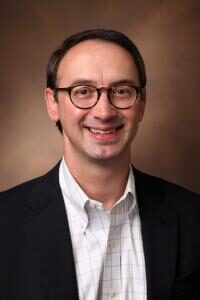Meet Dr. John Stafford, MSTP Associate Director for Clinical Education
by Jeewooo Kim (G1)
 Dr. John M. Stafford is an Associate Professor of Medicine in the Division of Diabetes, Endocrinology, and Metabolism and Molecular Physiology and Biophysics. He is also the Associate Director for Clinical Education for the Vanderbilt MSTP. His lab focuses on obesity and diabetes contribution to cardiovascular risk and he has a clinical focus on lipid metabolism.
Dr. John M. Stafford is an Associate Professor of Medicine in the Division of Diabetes, Endocrinology, and Metabolism and Molecular Physiology and Biophysics. He is also the Associate Director for Clinical Education for the Vanderbilt MSTP. His lab focuses on obesity and diabetes contribution to cardiovascular risk and he has a clinical focus on lipid metabolism.
Dr. Stafford first came to Vanderbilt as an undergraduate student in 1991. After spending some time off working in Wyoming, he then entered Vanderbilt Medical School in the MD program. In his first year he met Dr. Daryl Granner and worked in his lab. Dr. Stafford became fascinated in the role of insulin in gene regulation outside of specifically glucose control and enrolled in the MSTP after his first year due to his growing interest in research. He studied diabetes related gene transcription and metabolism signal coordination for his PhD. He also met his wife during his PhD studies!
After he graduated medical school, he did his internal medicine residency at Vanderbilt with the intent of treating diabetes as his career. For his endocrine fellowship he was part of the Harrison Society Scholars fellowship (American Board of Internal Medicine Research Pathway). During this fellowship he transitioned from primarily in vitro work to in vivo work focusing on dyslipidemia and heart disease in the context of insulin resistance.
He transitioned from fellowship to a faculty position in 2008 with the VA Career Development Grant. He started out with a postdoctoral member working side-by-side to figure out how his new lab would function. Dr. Stafford remembers it as a “very exciting time, getting to be creative and it was the first time I was not working off somebody else’s idea.” They decided to use genetic models in mice and tracers to better understand the connection between diabetes and heart disease.
As a practicing endocrinologist at the VA, he directs the lipid clinic at the VA, while balancing running a lab, and works with those who have genetic dyslipidemia and difficult to treat dyslipidemia with high heart disease risk. He is the chief of the endocrine service at the VA and continues to share consults with other physicians as well.
Dr. Stafford’s advice for balancing research and clinical practice to aspiring physician-scientists is to focus on how grant support can help maintain reasonable clinical time while doing research. He also recommends that having research line up with clinical interests helps avoid some of the problems of being spread too thin. He says some of the benefits of being a physician-scientist include having many ideas come from clinical experiences in the lab and both clinic and research provide different types of career gratification.
When asked why Dr. Stafford decided to take on this new MSTP Leadership Team role, he said he has always been interested in physician-scientist training. He recognizes a shortage of physician-scientists and wants to help promote the training, noting a need for them in the diabetes and metabolism field. He has been involved with the MSTP as a Sutherland-Watkins college advisor since 2006 when he was one of the first fellows to do so. He is also the director of the Student Research Training Program where he helps train prospective researchers every summer.
When Dr. Sally York (previous MSTP Associate Director) asked if he was interested, he wanted to be involved in helping students learn how to walk between the two lives of research and clinic. Dr. Stafford saw that opportunity in running our Clinical Preceptorship Program (CPP) where the students continue clinical education through graduate school as part of this position. He sees the goals of CPP to be showing students how you can see the gaps in knowledge that exist in the clinical fields that can become research questions, and moving past the historic perspective of MD-PhD programs compartmentalizing the two roles and being deliberate in balancing the two early in training. He also wants to help students build networks of connections to help support and mentor them throughout their whole training.
His advice for students in the MSTP include “take a long view of the program and build in time for wellness. Physician-scientist drop out is related to burn out, and it’s hard to go full level for 7 years straight and then go through residency and fellowship. Take walks, be there for friends and partners.”
His favorite part of the Vanderbilt MSTP is seeing how much of the program’s initiatives are student-led. He also is happy to be involved in the recruitment process since he gets to work with current students and also gets to know the incoming class well during the interviews.